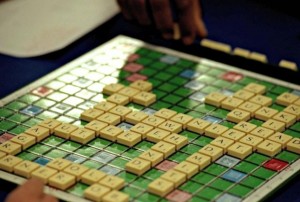I came across an interesting piece on Mental Floss the other day–the headline immediately caught my attention: “How Edgar Allan Poe Inspired Scrabble.” I knew it would be of interest to members of MWA, as pretty much anything about Poe is. The Mental Floss article, by Stacy Conradt, is reproduced in full here, by gracious permission of Mental Floss. You can view it in its original form here.

More than 150 million Scrabble games have been sold since Alfred Butts invented it in 1938. Every hour, approximately 30,000 people start a game, which you can buy in 29 different languages. It has inspired countless fights about spelling and proper nouns, and has taught people how hard it is to use the letter “q” in a word if you lack access to a “u” as well.
But none of this would ever have happened had Butts not been a fan of Edgar Allan Poe. In Poe’s short story “The Gold-Bug,” published in 1843, a character solves a cipher that is based on the popularity of English letters. “Now, in English, the letter which most frequently occurs is e. Afterwards, the succession runs thus: a o i d h n r s t u y c f g l m w b k p q x z,” he wrote.
While Poe wasn’t quite accurate with his assessment of the most and least popular letters, the idea of ranking letters by how much they’re used in the English language intrigued Butts. Because such a ranking didn’t actually exist, Butts created his own by tediously counting letters in the New York Times, the New York Herald Tribune and The Saturday Evening Post. Check out his complicated tally:
 Eventually, Butts acquired a partner who suggested several improvements to his concept, including the color scheme, the bonus for using all tiles in a single play, and yet another new name: Scrabble. Despite the multiple tweaks to name and gameplay, the game wasn’t massively popular until the chairman of Macy’s allegedly stumbled upon it while on vacation in 1952, then ordered thousands of sets for his stores. Scrabble has been a hit with word lovers and board game enthusiasts alike ever since, all thanks to a minor plot point in a 172-year-old short story. It’s a plot twist Poe probably never would have imagined.
Eventually, Butts acquired a partner who suggested several improvements to his concept, including the color scheme, the bonus for using all tiles in a single play, and yet another new name: Scrabble. Despite the multiple tweaks to name and gameplay, the game wasn’t massively popular until the chairman of Macy’s allegedly stumbled upon it while on vacation in 1952, then ordered thousands of sets for his stores. Scrabble has been a hit with word lovers and board game enthusiasts alike ever since, all thanks to a minor plot point in a 172-year-old short story. It’s a plot twist Poe probably never would have imagined.
—Stacy Conradt
June 8, 2015
 Stacy Conradt is a staff writer who’s been contributing to Mental Floss since 2008. As an avid board game lover, she is especially fond of her work on Split Decision and Mixed Nuts. In her spare time (ha) she likes to run badly and visit roadside attractions that make most people cringe. She never met an Abe Lincoln tribute she didn’t love. If you have one to suggest, let her know at twitter.com/stacy_writes.
Stacy Conradt is a staff writer who’s been contributing to Mental Floss since 2008. As an avid board game lover, she is especially fond of her work on Split Decision and Mixed Nuts. In her spare time (ha) she likes to run badly and visit roadside attractions that make most people cringe. She never met an Abe Lincoln tribute she didn’t love. If you have one to suggest, let her know at twitter.com/stacy_writes.
Ken Isaacson is the author of legal thrillers. His first novel, Silent Counsel, spent an entire month at the No. 2 spot on Amazon’s list of bestselling legal thrillers, surpassed only by John Grisham’s The Appeal and Harper Lee’s To Kill a Mockingbird.
